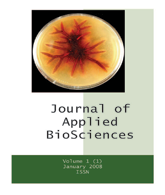Journal of Applied Biosciences (J. Appl. Biosci.) [ISSN 1997 - 5902]
Volume 34: 2173 - 2185. Published October 7, 2010.
Genome variability and plant age influence susceptibility to moisture stress in the cultivated bananas (Musa species)
*Baiyeri K. P and 1Ortese E.
Department of Crop Science, University of Nigeria, Nsukka, Nigeria.
1Crops Department, Akperan Orshi College of Agriculture, PMB 181, Yandev, Benue State.
*Author for correspondence: [email protected] ; [email protected]
ABSTRACT
Objective: Water stress is one of the major environmental constraints to crop productivity worldwide. As a consequence of climatic change, moisture availability (in terms of quantity, quality and duration) has become highly unpredictable in most places. In this study, the effects of moisture stress on six Musa genotypes were investigated at varying plant ages to ascertain the influence of age and genome composition on their susceptibility to transient drought condition.
Methodology and results: A six-week moisture stress was imposed on six Musa genotypes comprising the dessert bananas (AAA), plantains (AAB) and the ABB cooking bananas at varying growth ages (8, 12 or 16 weeks after planting) in a glasshouse. Growth changes in plant height, girth, number of live leaves, leaf area, and dry matter yield were evaluated after six-week drought and 6-week rehydration cycles. All the growth parameters were affected by moisture stress. Genome variability and plant age significantly influenced the response and sensitivities of these plants to moisture stress. The cooking bananas (ABB) and plantains (AAB) were more drought-tolerant than the AAA - dessert bananas. Similarly, the landrace triploid genotypes were relatively more susceptible to water stress than the tetraploid hybrids. The effects of moisture stress were more severe in the 16-week plants, while the 8- and 12-week-old plants were fairly tolerance.
Conclusion and application of findings: This study suggests that Musa crops at their early vegetative growth stage are more likely to withstand moisture stress than at their reproductive transition phase. Thus, field planting and other cultural practices (like irrigation and mulching) should be conscientiously planned to avoid prolonged exposure of plants to drought during their reproductive growth phase. The differential sensitivities of the genomic groups to the induced moisture stress makes breeding a viable option in combating soil moisture deficits in Musa species.
Key words: Musa genomes; ploidy level; plant age; reaction to water stress.
FULL PAPER [PDF AVAILABLE HERE]
